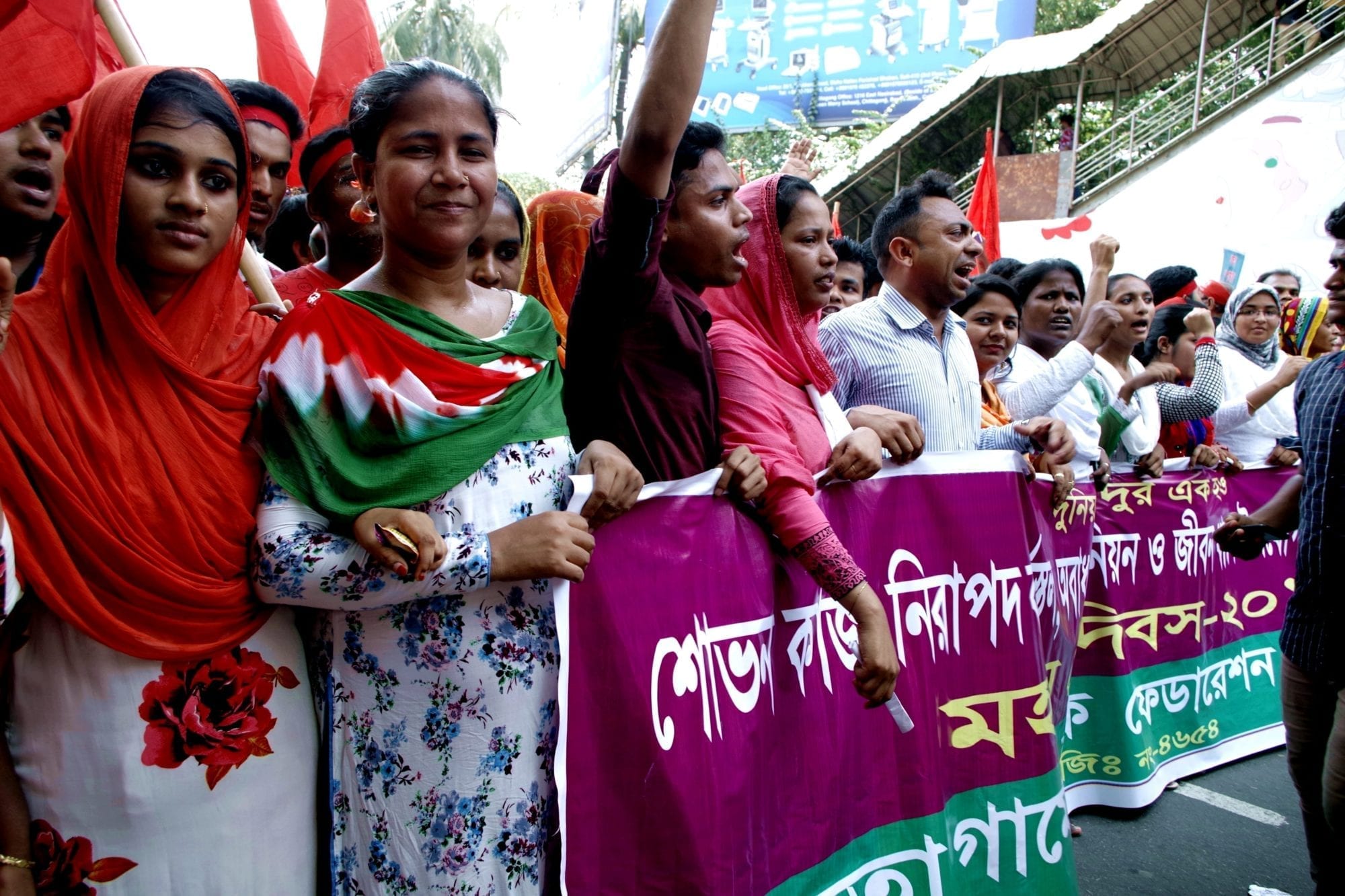
Jan 6, 2017
In mid-December, a strike in Ashulia, an industrial suburb of Bangladesh’s capital, Dhaka, and a ready-made garment sector hub, quickly snowballed into widespread unrest. Garment workers abandoned their factories to call for a living wage in response to ever-rising costs. Mass arrests and firings ensued.
The minimum wage for a Bangladeshi garment worker is $68 a month, an amount last fixed in 2013. When they took to the streets in December, workers were demanding the minimum be increased to $191 a month. Dhaka is the 71st costliest city in the world, in line with Montreal, Canada.
The strike started in Windy Apparels and rapidly spread to other units resulting in 60 factories suspending operations. On December 20, the Bangladesh Garment Manufacturers and Exporters Association (BGMEA) ordered owners to reopen factories and resume operations after a five-day break. However, upon their return, more than 1,600 workers were notified that they had been laid off due to their alleged involvement in the unrest. Labor leaders and activists collectively demanded the reinstatement of all workers but received no response.
Windy Apparels is the same factory that denied a worker sick leave in October despite a very serious illness. She collapsed on the factory floor and died upon reaching the hospital. Her body was left at the factory gate for her husband to retrieve.
Since the factories reopened, union leaders and worker rights advocates have been detained or arrested on charges related to their alleged involvement in the strike. Union activists from different federations and from different areas of Dhaka—and unrelated to the Ashulia unrest—also have been swept up by police. Many have been charged under the Special Powers Act, 1974, which provides police with sweeping power to detain individuals. The act has been used to suppress political opposition and peaceful demonstrations, as well as to retaliate against individuals engaged in personal disputes with people in positions of authority.
Journalists and nongovernmental organizations that focus on worker rights are also being targeted and intimidated by security services. Ekushey Television Journalist Nazmul Huda, was arrested on December 23 and held in police custody for two days−during which time he was allegedly tortured−on charges of inaccurate reporting on the strike.
Last week, police arrived at a community center operated by the Bangladesh Center for Workers Solidarity, an ally of the Solidarity Center, and ordered its closure.
As a result of this and the arrests of union leaders who had no role in the unrest, a chilling effect has taken hold with some other union federations closing offices even though they have not been ordered to.
International worker rights organizations, including the Solidarity Center, are monitoring the situation, and the Solidarity Center continues to track the registration of garment-sector unions in the country.
Donate now!
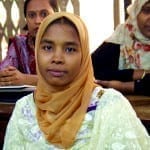
Your tax-deductible contribution to the Bangladesh Worker Rights Defense Fund will support Bangladesh garment organizers and worker-activists as they help workers who toil in unsafe factories for unfair—or unpaid—wages and who, without a union, cannot exercise their rights.
Activities your donation may support include:
• Medical care following an attack
• Safe spaces for organizers and their families who must go into hiding
• Legal assistance
• Transportation
• Awareness-raising activities regarding attacks on worker rights
• Replacement of belongings stolen during assaults
Your receipt for supporting Bangladesh organizers and activists will indicate The Solidarity Center Education Fund. The Fund is a tax-exempt charitable organization under section 501(c)(3) of the Internal Revenue Code. Your contribution is tax deductible to the extent allowed by governing laws. In addition, pursuant to the Internal Revenue Code requirement stated in Internal Revenue Service publication 1771, no goods or services were provided in return for this contribution.
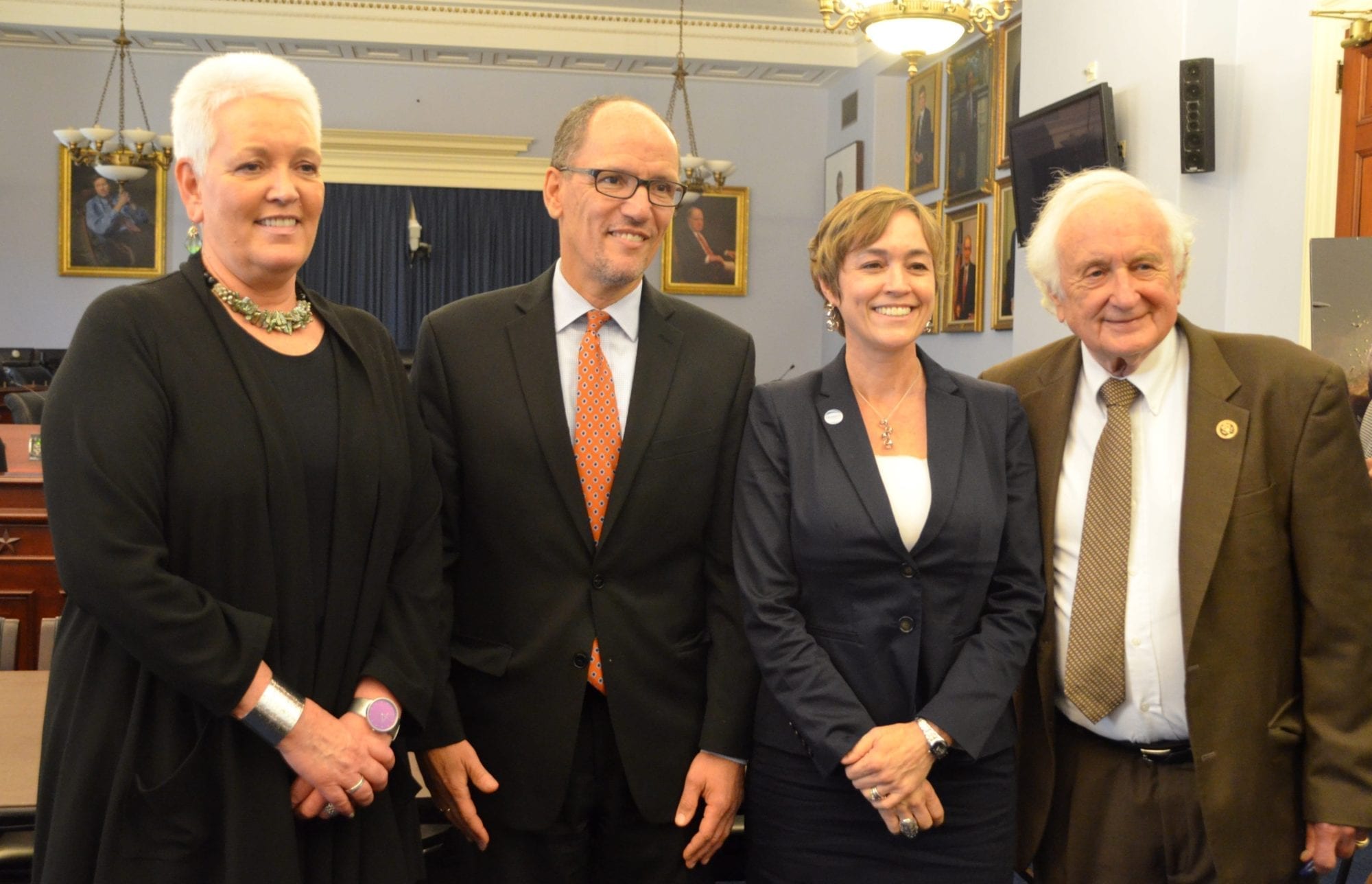
Jun 8, 2016
Dozens of congressional lawmakers, policymakers, union leaders, human rights and democracy representatives and other Solidarity Center allies gathered on Capitol Hill in Washington, D.C., yesterday to mark the launch of the Global Labor Program, a cooperative effort by the Solidarity Center and the U.S. Agency for International Development (USAID) to promote worker rights, gender equality and democracy worldwide.
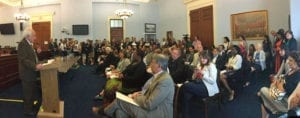
Rep. Sandy Levin spoke to a packed audience marking the launch of the Global Labor Program. Credit: Solidarity Center/Lauren Stewart
Opening the event, USAID Administrator Gayle E. Smith said, “Development cannot be sustained or inclusive without the availability of decent work. How do we reach workers? Through the Global Labor Program.”
The five-year Global Labor Program will further expand labor rights and strengthen workers’ ability to achieve decent work, lift the voices of disenfranchised workers and broaden gender equality.
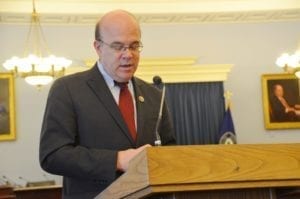
Rep. Jim McGovern: The Solidarity Center has stood by workers no matter how difficult the circumstances. Credit: Jessica Benton-Cooney/USAID
Praising the Solidarity Center for ensuring the “voiceless have a voice,” U.S. Labor Secretary Thomas Perez told the packed crowd that “the Global Labor Program is first and foremost about expanding worker voice and enabling workers to have meaningful input in the decisions that impact their lives and the lives of their families.
“When workers obtain their rights, it is almost always a step toward democracy,” said Rep. Sandy Levin (D-Mich.). Rep. Jim McGovern (D-Mass.) and Rep. Nita Lowey (D-N.Y.) also took part in opening the event.
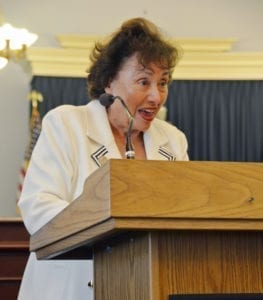
Rep. Nita Lowey: “Labor justice remains essential.” Credit: Jessica Benton-Cooney/USAID
In a letter to the gathering, Sen. Ben Cardin (D-Md.) wrote, “Solidarity Center’s ongoing work with civil society, labor unions and other governments is helping to promote both the universal values of human rights … in countries ranging from Colombia to Bangladesh.”
Following the opening remarks, moderated by David Yang, deputy assistant administrator in USAID’s Bureau for Democracy, Conflict and Humanitarian Assistance, experts from the development community took part in a panel discussion to examine the role of labor rights and civic participation in fostering more just and sustainable development.
Working People Hard-hit by Closing Civic Space
Panel moderator, Solidarity Center Executive Director Shawna Bader-Blau noted how “the effect of closing space is felt acutely by labor.”
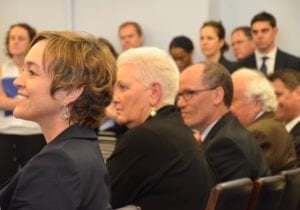
Solidarity Center Executive Director Shawna Bader-Blau, USAID Director Gayle Smith and Labor Secretary Thomas Perez at the Global Labor Program launch. Credit: Jessica Benton Cooney/USAID
“A forthcoming global survey by the International Trade Union Confederation is about to show a substantial global rise in documented attacks on worker speech and assembly rights, and specifically anti-union violence,” Bader-Blau said.
InterAction President Lindsay Coates continued the discussion on closing space for civil society, saying that “independent civil society is essential, but in country after country we see a growing crackdown on civil society space making it more difficult or even impossible for civic sector to do what it needs to do to help bring peaceful, sustainable ends to intractable crises and to advocate with governments and the private sector to push for development solutions and economic policies that really work for average people.”
Unions Needed to Secure Good Wages, Conditions for Migrant Workers
Turning the focus to labor migration, Jon Stivers, USAID assistant administrator of the Bureau for Asia, said labor and migration are crucial development issues in Asia—and unions are key to securing good wages and working conditions.
Further, “holding governments accountable is key to worker rights and open civil society,” he said.
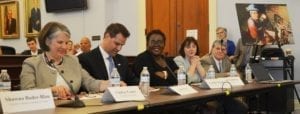
Event panelists included (from left): InterAction President Lindsay Coates, Jon Stivers, USAID; Caroline Mugalla, EATUC; Sarah Gammage, ICRW; and Rob Lederer, EICC. Credit: Jessica Benton-Cooney/USAID
Caroline Mugalla, executive secretary of the East African Trade Union Confederation (EATUC), said some 80 percent of workers across East Africa—60 percent of whom are young people—have jobs in the informal economy, meaning they generally are paid low wages, receive no sick leave, pensions or other social protections and labor in often unsafe conditions.
“If the issue of social protections is not talked about, especially for young people, we are not talking about sustainable development,” she said.
Women’s Economic Empowerment Crucial to Development
Discussing how sustainable development requires ensuring gender equality, Sarah Gammage, director of Gender, Economic Empowerment and Livelihoods at the International Center for Research on Women (ICRW), said strong unions bolster gender equality.
“Women’s economic empowerment is crucial to development, but we often neglect the connection between workers’ rights and gender rights,” she said.
Rob Lederer, executive director of the Electronic Industry Citizenship Coalition (EICC), also took part in the panel. The EICC is a nonprofit coalition of electronics companies committed to supporting the rights and well-being of workers and communities worldwide affected by the global electronics supply chain.
Closing the event, AFL-CIO Executive Vice President Tefere Gebre described the difficult conditions for workers he has witnessed first-hand in countries like Colombia and Ethiopia, saying, “worker rights are under attack in far too many countries.
“Our economies are inextricably connected, and we—as workers—are either going to be pitted against each other in a race to the bottom or we are going to be rising together creating shared prosperity for everyone.”
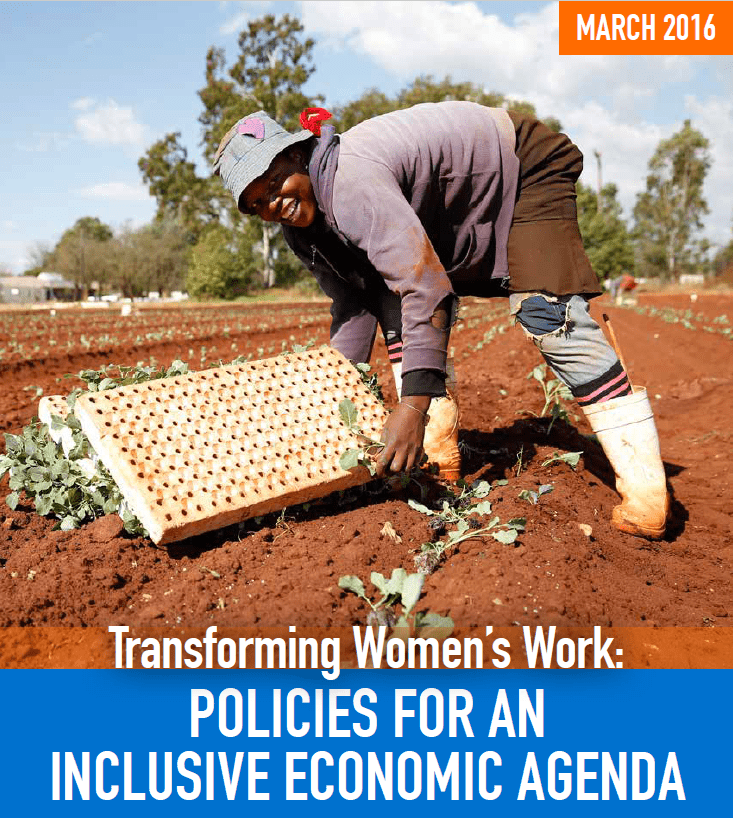
Mar 25, 2016
Convening experts from the AFL-CIO, the Rutgers University Center for Women’s Global Leadership and the Solidarity Center, this report examines how to shift governments’ policy priorities, create an enabling environment for social organizing and transform women’s interaction with labor markets within a rights-based model of development.
Download here.
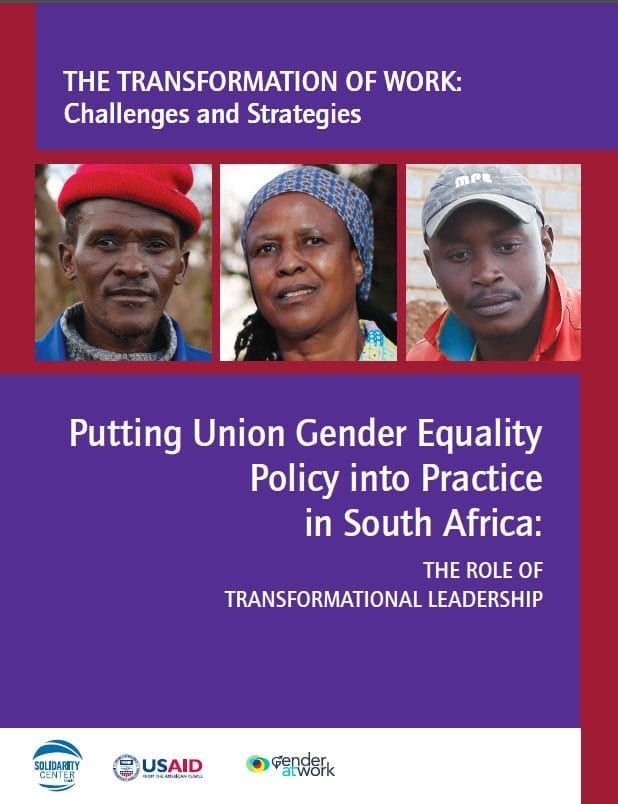
Oct 27, 2015
Unions are key drivers advancing gender equality. Yet in many countries around the world, there is a disconnect between labor union policy and practice in transforming gender inequalities within trade unions. Through the lens of the South African union movement, this report explores the disconnect and examines new strategies for closing the gap between policy and practice.
Download here.
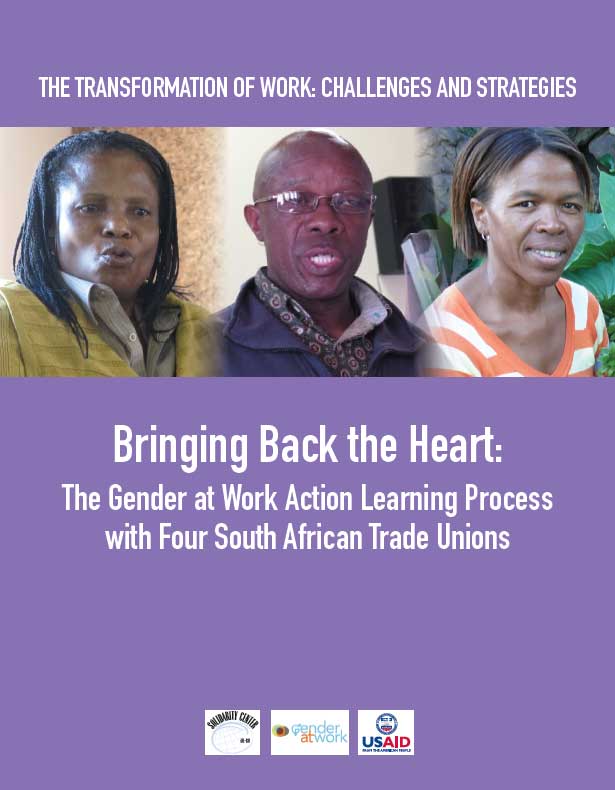
Nov 24, 2013
Four South African unions took part in a unique process with the South Africa Gender Action Learning Program and Labour Research Service to challenge male–dominated, hierarchical cultures. This report describes the step-by-step journey that led to more women joining unions and taking on leadership positions—and ultimately becoming inspired to carry on the hard work of ensuring gender equality remains an integral part of their unions.
Download here.











